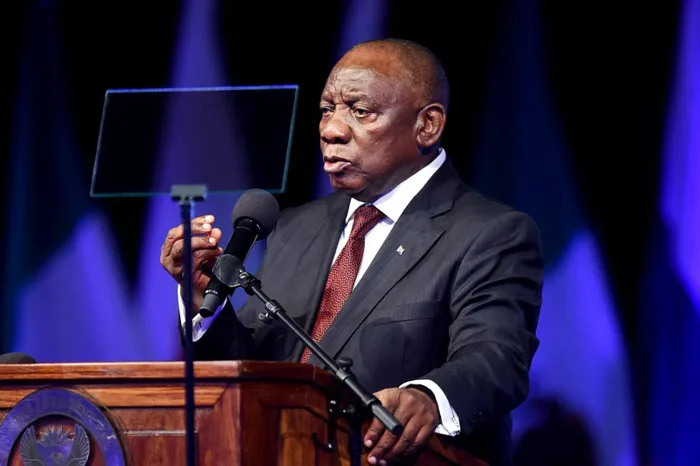
President Cyril Ramaphosa and Trump held a telephone discussion on bilateral trade matters with Trump on Wednesday morning, undertaking to continue with further engagements recognizing the various trade negotiations the US was currently involved in.
Image: Itumeleng English / Independent Newspapers
The government has reiterated its dedication to navigating trade waters with the United States through constructive engagement and negotiation as the hefty tariffs on exports come into effect from Friday.
This comes as the US President Donald Trump imposed a 30% tariff on South African imports, which are anticipated to have a profound impact on critical sectors of the South African economy, particularly the automotive and agriculture industries.
President Cyril Ramaphosa and Trump held a telephone discussion on bilateral trade matters with Trump on Wednesday morning, undertaking to continue with further engagements recognizing the various trade negotiations the US was currently involved in.
Minister in The Presidency, Khumbudzo Ntshavheni, said on Thursday that the Cabinet received an update regarding the Framework Deal established with the US, which aims to create a foundation for ongoing discussions.
A notable aspect of this agreement is a provision that stipulates tariffs will be reconsidered once the two nations reach a comprehensive deal.
“Government’s efforts remain focused on growing the economy to save and create new jobs, which include intensifying diversification efforts and strengthen their global supply chain integration as the country works to expand its export markets to Asia, Europe, the Middle East, and across Africa to enhance our economic resilience,” Ntshavheni said.
Meanwhile, Ntshavheni said the government was focusing on demand side interventions in the impacted industries and targeted interventions to ensure industry stability and safeguard employment.
The implementation of the tariffs has raised concerns among South African businesses that rely on exports to the US market, as increased costs could lead to reduced competitiveness.
The government this week warned that about 30 000 jobs in various sectors were likely to be impacted by the unilateral 30% import tariffs, hence it is seeking to craft an export diversification strategy leaning heavily towards China's R20 billion market.
Ben Farrell, global CEO of the Chartered Institute for Procurement and Supply (CIPS), urged African nations to step forward as leaders in the next era of global supply chains.
Farrell issued a warning against protectionist policies and blasted the US tariffs.
“The most popular vehicle in America is the Ford F150 – 45% of its parts are made outside America. Some of them here in Africa. Now these manufacturers are about to see a 35% increase in costs because of tariffs,” he said.
“Consider the implications of this unilateral national action against global suppliers. It’s insanity. The stars have aligned for procurement and supply around the world, and particularly here in Africa.”
The US is South Africa's third-largest bilateral trading partner after China and the European Union.
South Africa’s exports to the US account for about 7.5% of the country’s total exports, and in turn the largest category of SA’s exports to the US are precious metals, at 36% of total exports to the US, which are mainly tariff exempt.
The second largest category is vehicles, aircraft and vessels at 20% of total exports to the US, and the third, products of iron and steel at 14%. Mineral products follow next, at 6.8% and chemicals at 6.7%.
Investec chief economist, Annabel Bishop, said there were many different issues at play for South Africa in terms of trade balance as the country was running a surplus.
“We could be running a bigger trade surplus if we'd managed to repair the problems we have in Transnet. So there's still an opportunity for us to improve,” Bishop said.
“But I do think an important point is that around the world there's very fierce competition on trade. There's a lot of focus on price. And of course, what this differentiated tariff structure does is now make some countries more competitive than others. And South Africa, 30%, instead of the 15%, which most African countries are, is therefore prejudiced.”
Bishop also warned of direct implications of these tariffs on the consumer inflation. She said though the full tariff effect has not come through and was only going to be apparent towards the end of this year, there was an expectation that US economic growth will dip in the medium term as importers absorb the rising costs of imported products.
“But also, while it's not to forget that there could be a double whammy effect. If inflation comes out higher and, of course, remains persistent, then you also start to worry about going to higher interest rate territory,” Bishop said.
“Then has a secondary negative impact on consumers. At the moment, we don't think that's the case. We think the tariff impact is going to be once-off, if it is indeed a once-off tariff situation.
“Then the monetary policy authorities can look through that and say, “OK, we won't move our interest rates yet”. But it becomes more entrenched, and this is the problem with uncertainty. If tariffs fluctuate, if they move around, you're always at a moving target. You never really know where you are.”
BUSINESS REPORT